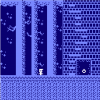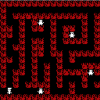“Dante’s Academia” by Julia Sebastian is a piece of electronic literature easily accessed through the free online journal The New River. In terms of accessibility, the choose your own adventure style narrative blends the ideas from Dante's vision of hell with the aesthetics associated with Atari and 8-bit games. However, one does not require knowledge of either to engage with the ideas central to Sebastian’s work. Sebastian's introduction establishes that more than being an homage to Dante or retro gaming, this is a story about trying to rise through the ranks of modern academia. Additionally, there are instructions at the start screen. Namely, when playing and reading "Dante's Academia," your computer's sound must be enabled— to experience the music Sebastian deems necessary for the experience. Conversely, it is not initially clear that the arrow keys are your way of moving through the story and interacting with objects. Though the instructions are minimal, it is very intuitive. Someone with no experience with this form of storytelling can quickly adapt and engage, meaning anyone with an internet connection can easily access and understand what they must do to experience "Dante's Academia.”
Now, for the type of movement this narrative promotes. The arrow keys mentioned earlier move a character through a dark forest, a shady club, a burning maze, and a military training ground, making graphic navigation the primary mode of movement. Additionally, Sebastian has piled each stage of the story with the aforementioned interactable objects, which imbue this game with elements of a hypertext narrative. Regarding hypertext, not only are there links for player/reader to reach additional information but there are also different paths and death screens— only by restarting several times can you experience all of them. I hesitate to say it is a perfect example of hypertext. While it does fit Nelson's definition that Landow explores in his work on critical theory and hypertext, there are branching paths, but these paths are limited to death screens that put the user back on track with the main story. Still, only if one chooses to engage with everything and explore the different outcomes will the main ending of the game, which impact is best when not spoiled, make sense.
With the function of this piece of E-Lit understood, it is worth examining how ‘Dante’s Academia” works to blur the line between player and reader in terms of engagement. As stated, the small forward provided at the start screen highlights how Sebastian is exploring the ways that modern academia is complicit in academic burnout, oversaturation of information to the point of hedonistic nihilism, and increasingly lofty standards leading to imposter syndrome. Each stage takes one of these problems and portrays it via a level of Dante's hell and a classic 1980s’ game. For instance, Sebastian uses a burning maze with no end in sight to capture the paralyzing effect of academic burnout. The stage combines imagery from Dante's sixth ring of hell, where heretics burn in fiery coffins with a Pacman-type maze. Noteworthy because Mayra points out in their book An Introduction to Game Studies: Games in Culture, Pacman is an early icon in the types of games "Dante's Academia" visually references and whose successors created the form of interactive fiction games that influence the type of interactivity in this story. Both function and referenced material blend the idea of playing and reading.
As for my experiences with the text, this gamification of Dante's epic poem demands high engagement from the user. Aside from the hypertext and maze, puzzles in each stage prevent the user from passive movement through the story. None of these puzzles are challenging, the hints that Sebastian provides make the direction the user needs to take obvious, but it nonetheless forces the user to engage with and read the text provided. It was easy to seek out all the available paths, with the only frustrating segment being the fiery maze. You must restart every time you hit a wall, and if you lack coordination— much like me— you might find the stage frustrating. Also, I have neither played the types of games referenced nor read Dante's epic poem but could appreciate Sebastian's exploration of modern frustrations. Also, for every reference to something like Pacman, there is a reference to current sites like LinkedIn, which keeps it accessible. Ultimately, this is all relative as this piece of E-lit can have many possible interpretations due to the types of references and gameplay made available and is worth the time to determine one's own.
To Access: CLICK HERE


